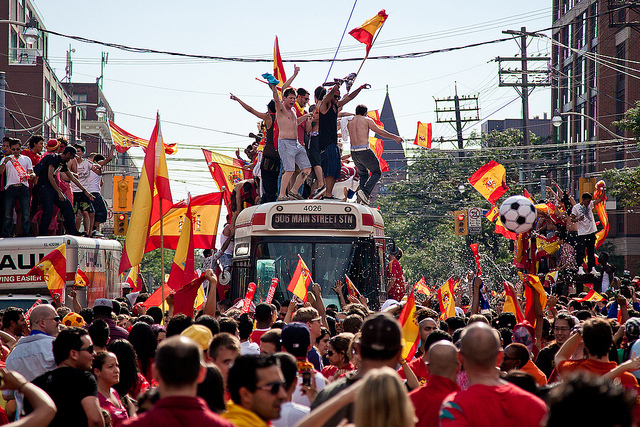"Multiculturalism and the World Cup in Toronto"
July 1 Asif Reza Akash recently wrote about FIFA World Cup fandom in Bangladesh. Here, Alvin Ma, 22, a Commonwealth Correspondent from Canada, offers a complement to those experiences with a perspective from halfway around the world in Toronto, Canada.
Asif Reza Akash recently wrote about FIFA World Cup fandom in Bangladesh. Here, Alvin Ma, 22, a Commonwealth Correspondent from Canada, offers a complement to those experiences with a perspective from halfway around the world in Toronto, Canada.
Whereas Bangladeshi people are watching FIFA World Cup matches at 10 pm, 1 am, and 4 am; Toronto is due north of Brazil. The match times make it simple for me to physically observe the “World Cup fever.” As I have mentioned in a previous post on my research interests, Toronto is arguably the most diverse city in the world, with over half the population born outside Canada and 223 different self-identified ethnocultural groups.
Reflecting this diversity, storefronts and street vendors eagerly sell team merchandise for not only Argentina or Brazil, but many other teams too. Several websites have compiled lists of places to watch the World Cup for the fans of all 32 participating nations, but they are not exhaustive. The “Minute 90” website in particular focuses on social media to highlight the best locations to watch and celebrate, which the website creators want to later compile into a documentary.
There is also a documentary entitled Footie by local filmmaker Stephen Young-Chin, which focuses on the 2006 World Cup in Toronto and sheds more light on the role of association football in Canadian society. Although Canada’s men’s team is dreadful in its current FIFA ranking of 110th in the world (the women’s team fares significantly better), the film notes that soccer – as is called in Canada – has overtaken ice hockey as the most popular sport for children. The film points to the 1982 World Cup celebrations as the moment when Toronto transformed from a “sleepy town” to a vibrant, cosmopolitan city.
During the group stage this past month, I experienced the vibrancy of fluctuating emotions firsthand by visiting restaurants in different Toronto neighbourhoods to watch the games. For the Germany vs Portugal match, I went to a café in the heart of the Little Portugal community, only to see Portuguese hearts broken after Germany scored three goals in the first half. The heartbreak was similar inside a Koreatown restaurant when Russia scored the equalizing goal to soften the loud “DAEHAN MINGUK” chants. And inside an Iranian restaurant when Lionel Messi scored in stoppage time, heartbreak silenced table-pounding Persian language chants.
On the other side of emotional heartbreak, passionate celebrations poured onto the streets as the tournament progressed and teams advanced. The celebrations mean road closures, and it should be noted that some individuals do not appreciate transportation delays in order to display pride for a country other than Canada. Nationalism is one of many complex World Cup-related political issues, ranging from civil unrest in Brazil, to terrorist incidents in other Commonwealth countries, to unfair trading practices of merchandise between Bangladesh and Canada. In the Toronto context, many people (including myself) find it all too easy to watch the matches uncritically and conveniently ignore the bigger global issues.
With that being said, some people and international organizations still want to perceive sports as apolitical. When asked about viewing sports as separate from politics, a few told me that they despise the governments of their countries of origin but still cheer for the country’s teams. Others do view sports as political, and state they could not cheer for the national teams of rival countries. But even though these people would not support their rival countries in international matches, many of them work and live side-by-side with others from those countries in our multiethnic, multicultural society.
Although I did not watch any matches featuring two intense rivals, our diversity can be seen when a Colombian delivery truck driver could playfully cheer against the flow of the crowd, yet calmly chat with me and the Chinese-Canadian owner of a Japanese-themed establishment before congratulating Japan for scoring a late first half goal against Colombia.
As it is Canada Day (July 1) at the time I write this article and many Canadians reflect on values such as multiculturalism, I think we should also reflect on multiculturalism through major events such as the World Cup, and foster more inter-cultural dialogue on how we can all work to make the world progressively better.
photo credit: wvs via photopin cc
…………………………………………………………………………………………………
About me:
I’m currently a student and research assistant for the Centre for Sport Policy Studies at the University of Toronto. I also teach English at an ESL language school and serve as a private tutor for various other subjects. Passionate about teaching, sports, and politics, I hope to blend these interests and one day teach university-level courses on the politics of sports.
………………………………………………………………………………………………………
Opinions expressed in this article are those of the author and do not necessarily represent the views of the Commonwealth Youth Programme. Articles are published in a spirit of dialogue, respect and understanding. If you disagree, why not submit a response?
To learn more about becoming a Commonwealth Correspondent please visit: http://www.yourcommonwealth.org/submit-articles/commonwealthcorrespondents/
…………………………………………………………………………………………………






